Share your knowledge & learn from experts
Because prepping and community go hand in hand
THRIVE – Long-term Wilderness Survival Guide – A review
This is a fine book and a superb reference and manual, with lots of solid opinions and recommendations. If anything, it is more comprehensive than it needs to be for most of use, but you never know.
I agree with the vast majority of his equipment recommendations. In contrast to many threads about very expensive survival knives, he recommends to Mora Kansbul (all of 37 bucks) and as the owner of several Moras, I agree. I also go along with his recommendations for a firearm and headlamp. In particular, he cautions against using a headlamp at too bright a setting. He is absolutely correct.
One minor quibble. Discussing emergency shelters, he makes no mention of rock shelters. Based primarily in the western US, I have often used rock shelters to great advantage.
Again, this is a really fine book, and a superb reference.
Read MoreFree FEMA webinar with TP and myself
Excited to share that FEMA has partnered with The Prepared to improve their public content and training! (How many other “prepper websites” can say that?!)
Our first webinar is in a week, Wednesday July 13th from 1-2:30ish US Eastern. A recording will be available after, which I’ll share here.
Update: Link to recording.
Registration: https://fema.connectsolutions.com/theprepared/event/registration.html
Their announcement:
I’ll teach/soapbox for 45 mins or so, then up to 45 mins of Q&A. We’ll cover the modern preparedness framework TP’s credited with popularizing, show specific gear examples, talk about skills and next steps, and so on. Basically a crash course for both personal prepping and how to teach others / be a community leader.
If you’re already familiar with TP’s teachings, there won’t be anything new (I’m essentially teaching what’s already on our website), but you’re of course welcome to join anyway — there will be a few hundred leaders from various CERT organizations, leaders of big FEMA chapters like New York City, and so on.
Read More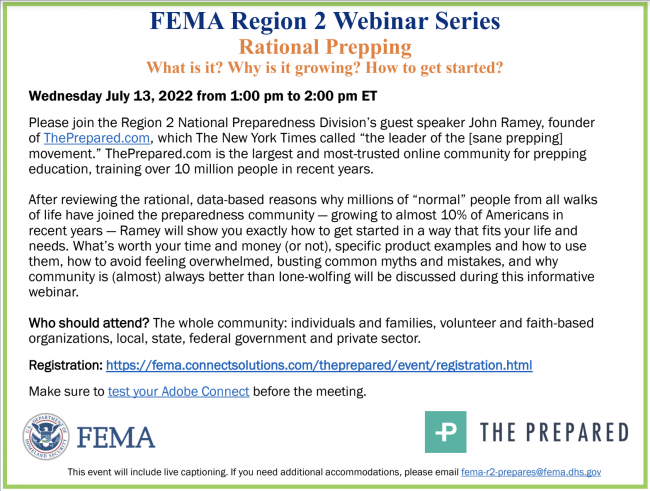
Prepping in old German barracks, an article about trying to stay positive about a collapse of the food supply
Yesterday I read this interesting article by The Guardian about a prepper who bought an old German barrack
Change is coming’: Meet the Englishman prepping for climate apocalypse in an old German barracks
Read MoreWould you like to make your own chicken coop?
I have some chickens in my backyard. Now I’m thinking about building a home for my chickens. I have seen some great coops in online stores. But after seeing some videos, I thought that maybe I could make a chicken coop. Maybe a greenhouse, a carport, or a trampoline….
Would you make a chicken coop?
Read MoreHow to maintain a fan?
Hello everyone,
It’s been a while but I had a question that I thought this audience could help out with. I have a few fans that I use around the house and seem to go through them every few months or years.
Do any of you know how to maintain a fan and keep it working for many years like new? I tried doing research but only could find the recommendation of “wipe the blades off of dust every month”. I probably could blow a can of compressed air in there every month to help things out, but is there any oiling I can do?
This little USB fan is perfect for my nightstand. It provides some good white noise, doesn’t make me too cold, low power draw, and I can use it with a power bank if the power went off. I want it to last the rest of my life but don’t know how to make it do that.
Read More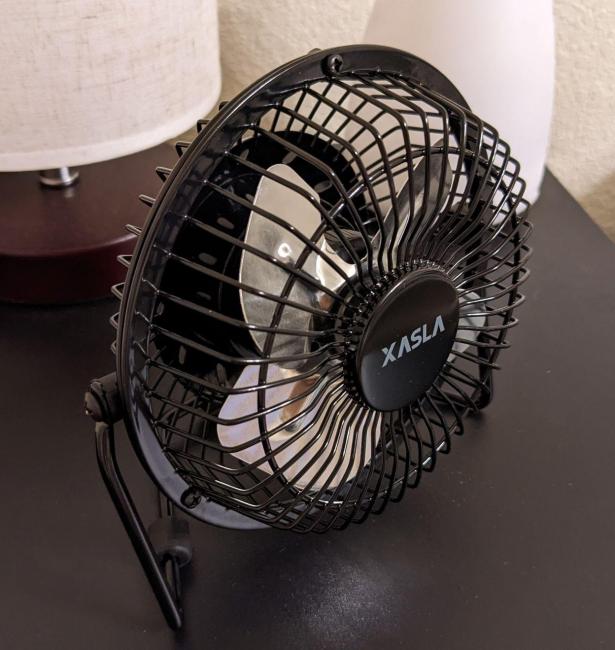
What OTC medications should we have on hand?
What over the counter medications would be good to have in someone’s medicine cupboard to be ready for those random sicknesses, allergies, injuries, etc…
It’s good to have these ready so can take them ASAP and not have to run to the store when you aren’t feeling the best, and also having them on hand could mean you have some supplies if there was a shortage. But I just don’t know what the best ones to have would be. For example, there are so many types of pain medications in tablet or liquid gel form of varying strengths and more which is the best ones we should have?
Read MoreOpinions on fire escape hoods?
Looking for opinions on fire escape hoods. One is on sale now at several sites such as https://mypatriotsupply.com/products/ready-hour-fire-evacuation-mask . For the price, it might be worth having a few around. It just concerns me that something this life-saving would be this inexpensive.
Read MoreWhat’s the likelihood that I will be able to live into my 80’s with the increasing number of disasters?
It seems there is a new disaster every week that is topping all previous records and it is getting me kind of freaked out. I’m only 18 and am wondering what’s the chance that I will be able to live well into my 80’s and die of natural causes. I haven’t been around too long, but from what I have seen, these man made and natural disasters are ramping up in frequency and intensity.
We have:
Global warming Pollution Over population leading to less resources Food and water scarcity War Civil unrest Pandemics Extreme heat or cold Drought and lots moreThings just don’t seem to be on a positive trend and I’m wondering if I will ever get to my 80’s or if I do will it just be pure survival and a struggle the whole time?
From you older generations, did you share similar viewpoints about the situation you and the world was in when you were my age? Am I over reacting?
Sorry to be the gloomy one over here, but it is something I’ve been struggling with lately. From what I have learned so far, it seems that being prepared will help increase my chances of survival and make life more enjoyable. So I am glad that I found this way of life.
-Tim
Read MoreMaking your own first aid supplies after a disaster
If a large region-wide or even country-wide disaster occurred which harmed many people, store shelves and hospitals will quickly run out of first aid supplies from band-aids, gauze, antibiotics, and more. The hope for us as the prepared is to have enough of this stored before this happens to be able to treat injuries we and those close to us sustain. But what if that disaster happens before we are able to accumulate all of those supplies or we run out because the disaster was worse than we had prepared for?
How do you craft and make various first aid supplies from things you have around the house? It will be hard to make things like antibiotics but instead of gauze for a large cut on the arm, could you use pieces of a tshirt that has been washed? Instead of band-aids can you fold a square of toilet paper and attach that with some tape? And even during the normal times, why not save a buck and make your own supplies? What makes the store bought gauze better or different than say a piece of tshirt or toilet paper?
I don’t have any answers but was curious if other people had thoughts on the subject.
Read MoreClimate change & gardening
Our planet is slowly, or not so slowly, heating up. That is simply a fact. When I was a kid living here in north Mississippi 60+ years ago, we lived on a lake and owned ice skates. Almost every year, that large lake froze over so that we could skate & camp out on the ice. I even remember someone driving a VW Beetle out on the ice. I can’t even remember last time even a small pond froze over even a tiny bit… much less freezing over enough to walk on it.
This year has been especially hot here and we are not yet into the hottest part of the year. Already we have had more days with the temp at 100 or above than I can ever remember. Most days have a feel like temp of around 110 or so. Our normal high for July is 92 and normally we rarely see a triple digit high. They have now become the norm. Here is our 7 day forecast. I’ve never seen such a forecast in July… especially considering we have been at or near those temps for weeks.
All this high heat has had a huge impact on crop growing around here. Our spring was so short, none of my springtime, cool weather crops produced anything. It got too warm too quick. So I trashed them & put in my summer crops and this has been the worst my garden has produced ever. I couldn’t get my tomatoes to grow. My peppers, which I though loved warm weather, are doing fine but not producing any peppers yet. My corn crop was the smallest & worst looking ever. My pole beans have grown wonderfully & have bloomed heavily, but are not setting any beans. I talked to the folks at the local farmer’s market & they said this is the worst year they have ever had. They are having the same issues.
I know that many plants will not pollinate properly when temps get up near 100. I knew corn was that way & weeks ago I worried about my corn. I water it weekly & the plants looked great, but when picked, there were much fewer ears & those ears were smaller & ugly. Many ears didn’t fill out at all. Others filled just partially. I now know peppers & beans, at least the varieties I’ve always grown are the same.
As a prepper, this greatly concerns me. With such temps, I would not be able to grow enough food to be anywhere near self sufficient. I need to research to see if I can find varieties that can grow properly in such high temps. I mean heck, the crops I currently grow are varieties picked to handle normal temps & humidity of the deep south, but they obviously aren’t proper for such temps. Since I think our planet will continue to heat up, I will need to rethink my whole plan.
My only hope is that I expect to have a very long fall, and I hope to replant soon and see if I can get some corn & beans to grow later in the year. I expect my peppers will put out huge crops once the temps moderate in a month or so. Around here our winters have gotten warmer & shorter. Spring is exactly the same. Our summers are very long now, longer than normal & our Autumns are likewise. Hopefully the first frosts will hold off for me to grow some food.
Anyone else having heat related issues in their gardens?
Read More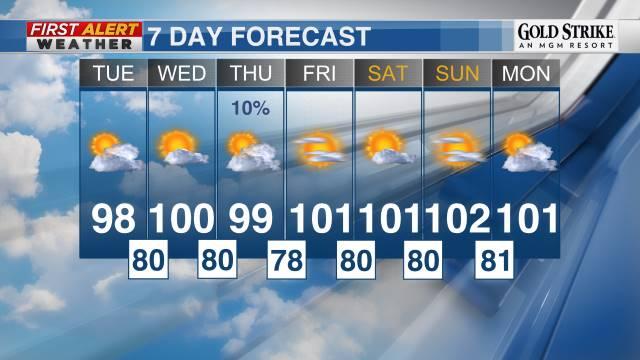
Survival Gardening … Make your own seed vault
When I first started prepping, I knew how important it would be to have plenty of garden seed on hand in case of a severe crisis. So I would purchase seed vaults online that had lots of seed, could store a long time and had lots of variety. However the problem with these commercially made seed vaults is that that contain all sorts of varieties that probably wouldn’t do well in my specific climate and location. I knew a lot of the seed would not do well here.
So about the same time that I started putting staple foods in my own long term storage, I decided to do the same with garden seed. For me, long term storage means the items are inside sealed Mylar bags with either desiccants or oxygen absorbers inside. This bag was then inside a sealed 5-6 gallon plastic container. These containers are stored inside a prepper room I built in my upper barn that has its own AC unit, so the room stays in the 60s or less year round.
Now I understand gardens seed will not last anywhere near as long as my food items. Things like dried beans, rice, wheat berries, etc. can last 30+ years in such conditions. Most seed would last only a few years. So each year, I put up a new container of garden seed. Each container (seed vault) contains the basic garden seed that could sustain my family for a year, along with fruits & berries from my orchard, catfish from the pond & wild game in the woods. These seed are varieties I grow each and every year, so I know they do well in my specific location. I don’t have anywhere near the number of varieties found in commercial seed vaults, but every seed I have are varieties that grow here with minimal to no fertilizers & other garden chemicals… even though I keep more than a year’s supply of such in storage.
My philosophy on survival gardening is to keep it simple. I also wish to extend the growing season as long as possible, which is pretty long here in north Mississippi. So my seed vaults all contain cool weather varieties. Tops for me are collard greens. They grow early spring & late fall & produce huge crops of nutrient packed leaves. I normally include some English peas, which also are cool loving, but this year I put them in my freezer in the barn, for very long term storage. For warm weather varieties, my core crops are the three sisters, grown for ages by native Americans all over this country. They include corn, pole beans & winter squash. They are called companion plants because they all assist the others. Corn grows tall & strong, and provides the support for the pole bean vines to grow on. The pole beans, being a legume, fix nitrogen on their roots & provide natural fertilizer for the corn. The winter squash vines stay low to the grown & provide ground cover to help maintain soil moisture & to smother weeds.
I always include amaranth in my seed stores and I feel amaranth is probably the most valuable variety for survival gardening. It was a staple crop of the Maya civilization in central America. Its leaves are super nutritious as are its seed. Each plant can produce a half pound of seed each and the seed are tiny. A single plant will produce hundreds of thousands of seed. Amaranth in its native form, which I have growing wild on my property, is a weed. You almost can’t kill it. Across the country farmers fight it because it grows so well & reproduces so fast. This family trait makes the commercial varieties so easy to grow. They handle drought well, as do most weeds. Cut the top half of the plant off, and in a few weeks it will have regrown. These plants can get over 6 feet tall. The seed can be ground into flour or eaten as a porridge.
So here is what is in this year’s seed vault:
10 lbs Rattlesnake pole beans 5 lbs Tennessee Red Cob corn, 5 lbs Truckers Favorite corn
1 lb Georgia Southern collards 1/4 lb Seminole pumpkins 1/4 lb Green Callallo amaranth
Seed count is as follows: corn: 12,800 pole beans: 11,000 Seminole pumpkin: 1100
Georgia Southern collards: 100,000 Green Callallo amaranth: 150,000
Read More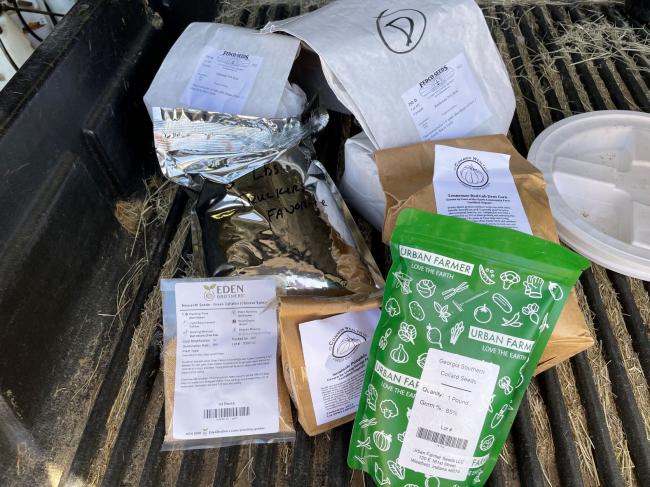
(EDIT: I’m stupid, BigBlue has an EU warehouse) Looking for a solar panel comparable to the BigBlue 3 (28 wat) in Europe
EDIT:
Hi all,I’m looking to purchase a solar panel comparable to the BigBlue3, which performs ‘well enough’ in cloudy/overcast conditions. So far I could not find any retailer in Europe which does not sell it for a nearly 90% mark-up and was wondering if there are comparable panels available which are in a similar price bracket. Also just curious, but does anyone else have a habit of wanting to go light in weight which ends up succeeding. But then taking in extra things (camera, battery banks, bluetooth speaker/buds, a camping chair) because there is left-over space/weight? (it helps with slowing me down and walking with the rest of my buddies though)
Lastly thanks Prepared for all the research they have done, legends that they actually look at stats/data instead of using vague definitions.
Read MoreWill 110 gal of water ruin my foundation?
I just purchased two of WaterPrepared’s 55 gal water tanks: https://waterprepared.com/products/blue-55-gallon-water-storage-tank. My plan was to store them in a corner of our outdoor shed, which is built on a concrete foundation. When I went to clear out that part of the shed, I noticed that there is severe cracking in the foundation all along the wall. See photo.
I don’t know if this is caused by:
1) the 400 lbs of water that is already stored on that side of the shed in 5 gal containers. But the water wasn’t stored in that corner–the row of 5 gal containers starts on the cardboard on the left side of the photo.
2) the current drought which is drying up our clay soil so that it contracts underneath the foundation. This is a major problem in our area; we have to put soaker hoses around our home’s slab foundation to keep it evenly moist or it will crack. We don’t have soaker hoses around the shed.
It’s only a shed, so I’m not very concerned about the foundation cracks. But I don’t want them to get majorly worse, like having that side of the shed sink 3 inches into the ground! Do I need to find a different place for the two 55 gal water tanks? Maybe putting them on the other side of the shed would be sufficient. I had hoped to be able to stack them in order to save space, which would mean about 900 lbs resting on about 4 sq. feet of space.
Read More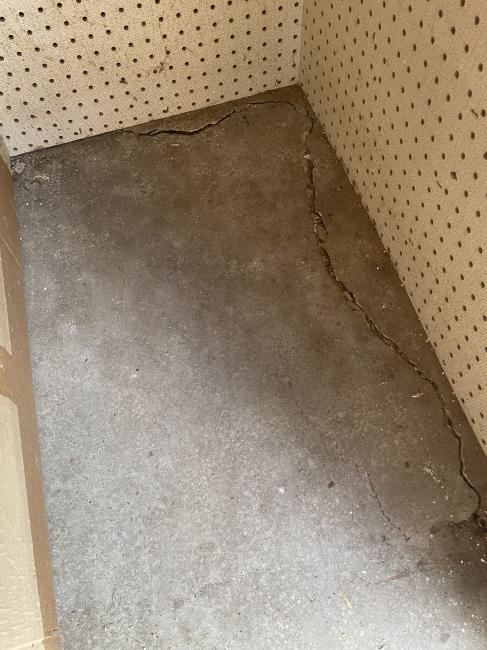
What is a working (i.e., preppable) definition of “civil unrest” or disorder?
One discussion I find less satisfying in these forums is the occasional reference to civil unrest. Obviously these events happen with some frequency, but I don’t see any clear definitions of what this is, what kinds of specific threat it presents, and so on. Of course one of the problems with protests is that they can inspire fear and anger in observers, so one implied definition seems to be “political protests I don’t agree with.” In keeping with the rationalist approach of this site I’d like to have a discussion that’s more specific about the issue. This is especially important given rising social tensions and uncertainties.
Wikipedia has a reference list of events in the US. There’s other info about other western countries on line too. https://en.wikipedia.org/wiki/List_of_incidents_of_civil_unrest_in_the_United_States
If you read through a few of the entries within the last 20 years, there are some common characteristics:
– They don’t emerge out of nowhere, meaning they’re usually preceded by a call to protest or other action by the actors, with dates and locations given.
– Spontaneous riots are relatively rare, and even then are often anticipated by police (sports events, controversial criminal cases, etc.).
– They very rarely spread outside a small area (a few city blocks, an industrial site, a politically charged memorial).
– They burn out within a days or weeks.
– Most of the time, they appear larger and worse in media/social media than they do up close.
So, in our recent experience with unrest in the West, there has never been an incident where every region of a city erupted into chaos, where a government collapsed, where vital infrastructure was destroyed, or where large numbers of bystanders were injured. But property damage, especially to non-involved parties has been significant and reprehensible at times.
I’ve taken part in protests myself (environmental) and have never wanted anything to get out of hand. I’ve also observed protests or large disturbances (sports events) that threatened to get out of hand, and just stayed away. I was safe after moving about two blocks away.
I am absolutely not deriding anyone who fears this kind of disorder, but I do think we should have some way of understanding how real the threat is, and how extensive it can be (number of people, geographic scope, amount of damage if any, etc.).
Read MoreHappy Fathers Day! What has your dad taught you?
I am not a father or am anywhere near being a father any time soon (just graduated from high school), but I thought it would be nice to talk about ways that our fathers have taught us skills or lessons that can apply to discussions on this forum.
I always enjoyed camping with my parents growing up and learning things like how to start a fire and set up a tent safely while looking for dead overhead branches and making sure you don’t sleep with your head going downhill.
Love you dad!
-Tim
Read MoreBald eagle photobombs my horses.
I was on the tractor down in the bottom pasture cutting the grass when I noticed my horses at the pond. I started a video, hoping they would play in the water. Just then, one of my resident bald eagles decided to photobomb the horses. I do so love these eagles.
https://www.youtube.com/watch?v=KdrvwnXiPNY
Read MoreBudget emergency radio – is this a reasonable option?
I’m looking to get an emergency radio that would be suitable for my go bag, and I’m on a limited budget. This option is turning up on a website where I’m looking for other things, and the $20 CAD price seems great: https://72hours.ca/collections/radio-and-communication/products/72hrs-crusader-mini-noaa-radio-am-fm
Is there an obvious reason it would be a bad choice?
Read MoreSeeking ideas for prepper related challenges/experiments
For years I’ve been doing various prepper-type challenges, sometimes with a friend and sometimes by myself, but we’re kind of running out of fresh ideas lately. I thought maybe this community would have some good suggestions:)
To give an idea of the sort of thing I’m talking about, past challenges have included “a year without a water heater” “cut a season’s worth of firewood by hand” and “a month eating only wild food foraged day by day – no dipping into stored food.”
So please don’t suggest anything as simple as “practice a fire drill” nor as extreme as “walk into the woods and see how long you can live out of your BOB.” (Which sounds fun, but I have responsibilities at home.)
Right now I’m following a project to use WWII era ration stamps as though it’s 1943, although that’s more historical then truly prepping related, as there’s no reason to think that the same foods would be rationed in the same amounts should a similar program ever be needed.
If anyone has ideas please share them. Bonus if it’s something you’ve done yourself or would be willing to do, because then we could compare notes on here:)
Read MoreSanding down a cast iron pan for that “smooth as glass” finish – Awesome results!
Just a heads up, but I am very new to the world of cast iron cookware so hopefully you seasoned veterans (cast iron pun) will go easy on me. I know cast iron people are very opinionated.
– – –
Being new to cast iron, I always wanted to strive towards that “smooth as glass” finish that people seem to get. Where an egg will just slide off not leaving anything behind, but after years of working towards it I never could get it to be as non-stick as I would have liked it to be. There are some techniques that I learned about a year ago that did make a big difference like only using the smallest amount of oil and applying it to a hot pan in between cookings instead of a large amount of oil to a cold pan like I was doing, but I still knew I could get it better.
While watching some YouTube videos of Cowboy Kent Rollins, I came across a video of him talking about using actual sand paper on your cast iron to shave years of wear off of it. He says that you could get to that finish naturally in like 30 years of use, but in just a few minutes you can fast track the process and get to enjoying your pan sooner.
Looking into it further I learned that cast iron cookware is called such because the iron is cast into a mold made of sand, which is why it has that rough texture. If you look close on your pan you will understand what I am talking about and see all the grains of sand that the iron formed around. This texture however, makes for a lousy cooking surface and is why you have to apply layers of seasoning to fill in these holes and pores to get that smooth surface.
You can do this solely by hand, but a cheap $15-$20 electric sander will make it go by much more quickly. There still will be areas that the sander can’t reach that need to be buffed by hand though. I first started off with some cheap sand paper but was going through it very quickly and not much material was coming off. I then switched to my good stuff and it made a world of difference. I highly recommend 3M’s pro grade precision sand paper with Cubitron II technology. For this project or wood working, this is the best stuff that lasts extremely long.
Start out with a course grit sand paper (like 60 grit) and take the bulk of the material down, buff down sharp points, and get it to more or less how you would like it to be. Then follow up with some medium grit (like 120-150 grit) to smooth things out more.
The goal here is just to knock down the high points and not to get it down to a mirror finish. There needs to be some pitting and texture for the seasoning to adhere to.
Here’s a video showing the before and after in better detail than a picture is able to do.
https://youtu.be/MT5dE4QdppA
This will strip any existing seasoning on your pan and you will have to start it over from scratch. The bare iron that you have exposed will be very sensitive to rusting so you need to at least put on two layers of seasoning before you start using it. Do this by preheating your oven to 450–500 degrees F. Place aluminum foil on the bottom rack of the oven to catch any excess oil. Apply a very thin layer of oil on your cookware and place it upside down on the center rack. This helps prevent oil from pooling on the cooking surface. Bake for 1 hour. Take it out, let it cool down, and repeat and it is ready for use.
Did it work? Yes! After about a month of regular use, a good seasoning built up again and I finally got that non-stick finish that I was looking for. It is just so much nicer to cook in now. Here’s the residue that was left after cooking some eggs:
Getting that cooking surface to a non-stick finish was great but another benefit of going through this sanding process was that I was able to knock down the sharp edges of the pan and handle. I can’t stress enough how great it feels in the hand now compared to what it used to be like.
I have two more skillets and a dutch oven that I want to apply this finishing process on. This took a cheap Lodge pan and transformed it into a much higher quality pan that functions and feels significantly better.
Read More
Preppers and climate change
I want to raise a question about what a prepping mindset means for prevention, especially in the area of climate change, which is driving so many emergencies and disasters. I realize we have diverse folks here and I really don’t want to start a political fight. To me climate change is an issue that should actually unite all of us, but I realize that some people feel otherwise. If you’re reading this and you don’t believe in climate change or don’t believe that it’s caused by human factors, I would like to respectfully ask you to please just skip this thread.
I’m in California and my prepping has been very heavily driven by the radical increase of catastrophic wildfires in the last few years. It’s no secret that climate change is a major cause of these. In general I’ve been feeling a great deal of urgency about arresting climate change along with all the related issues like large scale species extinction. It seems like the stakes couldn’t be higher and time is very short. I don’t see that our government is moving nearly fast enough to deal with this crisis.
Lately, tired of feeling helpless and anxious, I’ve started wondering what the average citizen can do to help reverse this problem. Of course we can recycle and all that, but truly these individual actions make a very limited impact on climate change. Individuals aren’t the main drivers of the changing climate. In addition to not knowing what I can do to make a greater impact, I, personally, am not much of a conventional activist — meaning I personally get de-energized and turned off by marches, slogans, petitions and all that. (I’m not saying these aren’t necessary, it just doesn’t match my temperment.) So, I’m looking for other ways to get involved.
It suddenly occurred to me that here we have a community of folks who are more aware than the average person of the dangers we are facing and I thought I would ask if any of you are also thinking about how to arrest and reverse the problems we are facing, rather than just prepare to deal with them when they come down the pike. It all seems to be part of one holistic outlook to me. I would be interested in hearing your thoughts.
Read MoreAC Apocalypse. Whatcha gonna do?
20+ year old a/c unit, 90-100º forecast for days… need I say what happened over the weekend? I’ve been around for a while, namely since before a/c was common. Boy, how quickly we forget how pampered is our rich-world life.
On a related note, I saw Texas Reliability forecast blackouts down there and urged folks to turn off the AC, riiight.
So just a thread to think about heat related actions if not preps. According to Wiki in most years, more people succumb to excessive heat than any other weather related cause. Obviously GW is causing anomalous heat waves (like in the PNW last year) and especially prolonged heat events are dangerous because warm nights prevent the cooling respite more fragile bodies need.
Just a few random things:
If you are in a dry climate, evaporating water, however you can get that to happen, is the natural solution. Water changing from liquid to vapor absorbs heat, cooling it’s surrounding. But in humid climes you need other plans. We live in Missouri now, dry in the winter and wet—er in the summer. Here a summer breeze is as likely as not to be so saturated that not only is your efforts to evaporate water for cooling inefficient but your own perspiration is much less effective. Be especially cautious when the dew point is high, 65º ot higher because your natural cooling is less effective.
Warmer air holds more water, to a point. The dew point is the temperature at which the air is saturated, below that temperature the moisture in the air condenses—forms dew. Think of a cold drink glass with beads of water on the outside, the glass is colder than the dew point so moisture from the air condenses on it. But on the flip side, with a high dew point the air is already near-saturation and perspiration or a wet kerchief is less effective as cooling because water won’t evaporate into near-saturated air so won’t absorb heat in changing phase.
So, getting out of those weeds, we live in an old house 150 years maybe. Old houses had lots of cooling strategies we can implement in an emergency. Our house s 12′ ceilings and windows that go up almost to 10′. Open down the top sash and open up the bottom at night and automatically a convection current sweeps out the hot air at the top, pulling in cool air at the bottom—even with no breeze. That is if the air cools off at night. The US SE may not be uninhabitable in a warmed future because humidity holds heat, preventing night time cooling.
Houses once employed breezeways to, you know, catch the prevailing breeze. Also they did pay attention ot orientation. Here in SW MO the prevailing wind is from the NW in winter but the summer breeze usually comes from West or SW. So the old houses keep their backs to the NW and their sitting porch to the SW—to catch the summer breeze and shade the summer evening sun that is WNW about now.
Of course you can’t reorient your house in an A/C apocalypse but you can think about those natural angles. Say leaving the drapes closed on the East in the morning and west/north in the afternoon. In the evening, open the windows and go outside as soon as outside is cooler, the SE side will have been in the shade longest at 9P so will be coolest, everything else equal.
Anyway long enough rant for now. I fixed the AC so gotta go enjoy it. What strategies do you have for dealing with AC Apocalypse?
Read MoreRemove rust off your gear and tools with vinegar or ketchup
Did you know that vinegar is a great way to remove surface rust off of metal objects like tools, stoves, or camping gear? I didn’t, but after seeing it done on YouTube I gave it a try and it worked quite well.
I do take care of my tools, but have inherited and found some used tools that were neglected and gathered some rust.
The following two were my fault though. The small pair of wire cutters and the rust on this parang were from me not applying a protective layer of oil on them.
The first step is to scrub everything down with soapy water to remove any grease or oil that is on there. This is an important step because I forgot to do that the first time I put all these in a vinegar bath and not very much rust came off. After washing them properly and then soaking in vinegar again, it worked much better.
Because it would take quite a lot of vinegar to submerge the parang, I opted to try spraying it and the wire cutters down with some ketchup on just the areas that have built up rust.
The rest of the tools I submerged in vinegar for 24 hours. Without even touching them, look at the rust that has just flaked off.
Taking a brass wire brush, I lightly brushed off the remaining rust and the tools are looking much nicer now!
Some of the files and punches still had some of the 20+ year old rust on them, but they do look much nicer now and I’m happy with the results. Another soak or two with additional brushing probably could get them back to new.
The parang however didn’t show any signs of improvement. I’m not sure why, because the ketchup worked great on the wire cutters. Maybe it is the type of steel it is made out of.
I then put some oil on a rag and wiped all the tools down to prevent this from happening again.
Neat little trick, but hopefully I never have to do it again and can prevent this from happening with proper maintenance in the first place.
Further reading: How to maintain garden tools with a bucket of sand and oil
Read More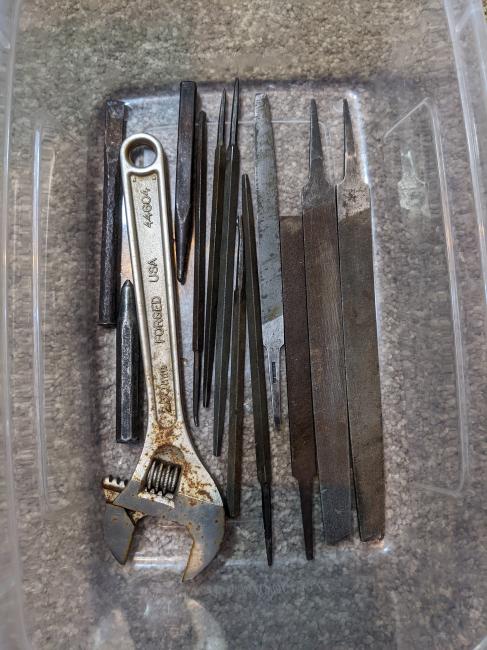
See you later Alligator! – How to avoid and survive an attack
Cute little guy, but also slightly frightening…
I am hoping to visit Florida later this year but have been worried by seeing one too many news articles of people being attacked by alligators. After some research though (which I’m sharing below), I’ve come to the conclusion that attacks are rare and can be mostly avoided by taking a few steps. I’ve seen quite a few people on this forum from the southeast, so please share any additional experience you have.
Florida man killed in possible alligator attack while searching lake for Frisbees –
Quick summary: Man was out late at night looking for frisbees along a lake and gets attacked by an alligator. Another person finds his body the next morning.
Lessons learned: Don’t walk around bodies of water at night when your visibility is limited and alligators are more active. If you NEED to go around water at night, wear a headlamp and look around for glowing eyes reflecting back at you.
This person also was known to frequent the park and disregard the posted “No Swimming” signs. So follow the rules.
An alligator killed a person near Myrtle Beach in South Carolina –
Quick summary: Not too many details here except that the person died near a retention pond.
Lessons learned: So even shallow and man made bodies of water can have alligators.
Woman killed by gator on Kiawah Island was ‘fascinated,’ took pictures before attack –
Quick summary: Lady sees a alligator in the pond of a friends house and goes out to take pictures of it. Her friend warns her that the alligator grabbed a deer from that spot the other day and the lady just ignores her and says “I don’t look like a deer.” The lady then goes in to touch the alligator and it grabs and pulls her into the water. The husband of the friend grabs a rope and throws it to her to try and pull her out but the alligator got her to waist deep water and rolled pulling her down and killing her.
Lessons learned: Pretty obvious here to most. Don’t get near alligators, don’t try and pet them. If you are trying to save someone who is being pulled in by one then do what these guys did and throw a rope and don’t go in yourself.
After SC’s 2nd fatal alligator attack in 2 years, incidents remain rare, authorities stress
Quick summary: Lady walks her dog near the water’s edge and the alligator lunges out to eat the dog but only grabs the leash. The lady is able to unhook the dog’s collar but the alligator then pulls her in.
Lessons learned: Again, stay away from the water’s edge in places where alligators might live.
Coroner ID’s mother, 2 young children killed after car hits alligator on I-95
Quick summary: Mother and two young children hit an alligator crossing the road and then crash their car and die.
Lessons learned: They can even get you on the highways. Drive slow, especially around blind corners and hills.
A Florida Girl Survived an Alligator’s Attack by Shoving Her Fingers Up Its Nostrils
Quick summary: Finally a good story. 10 year old girl sitting in some shallow water is bit by an alligator. She thumps it on the head and nothing happens. She then remembers a survival technique she learned when visiting Gatorland and stuck her fingers into it’s nostrils which caused the alligator to open it’s mouth.
Lessons learned: Pick a alligator’s nose if it bites you.
Here’s some comedic ways to deal with alligators/crocodiles. (not recommended):
Hit them over the head with a frying pan
Get them into a trash can
How to avoid an attack:
These are the areas where the American alligator live
Above image source
From what I learned, there are some crocodiles in Florida, but they are rare and the main threat you are likely to encounter in the USA is the American Alligator. Still, tips on how to avoid them should be about the same.
From CNN article –
Spring to early summer is mating season and protective mothers watch over their eggs hatching in September and October. Winter is the safest season because it is cold and they aren’t doing a whole lot.
When temperatures start settling into the 80s (27 Celsius), gators become mostly nocturnal. So it’s best to avoid that refreshing night dip in unknown waters when it’s hot.
Don’t feed, bother, or provoke alligators. Feeding them is bad because it makes them associate humans with food.
Avoid heavy vegetation near the water’s edge where they might be nesting or waiting.
If you are attacked, try poking the eyes or sides of the mouth. If you are on land, avoid the myth of running in a zig-zag and just run in a straight line. If you are caught in the famous death roll, try and roll with it to reduce tearing of your limbs.
From forestwildlife.org –
Check for ripples in the water, look for backs, eyes, or snouts sticking above the surface. They are most likely to be near the shoreline, in shallow areas, and in weedy areas.
If you hear this sound near your area, avoid it.
Although, they most likely are going to be silent and stealthy when stalking their prey.
Fight back by punching, kicking, and poking it’s eyes. Try and stuff objects like a life jacket into it’s mouth and trigger its gag reflex.
If you are swimming in the water and see an alligator swimming by, remain calm and stay as still as possible to not draw attention to yourself.
The Legend himself
Read More
A review of NextDNS. Stop unwanted content from ever reaching your internet connected device
Summary: This post goes over how to speed up your internet and stop unwanted content from ever reaching your device for free. It’s very easy and can be done in less than 15 minutes.
What is DNS?
In simple terms, it’s like a phone book of the internet. If you type https://theprepared.com into your web browser, that request is sent over to a DNS which converts that to the IP address (172.66.43.161) which computers can understand. This all takes a fraction of a second, but those fractions of a second can add up over time.
What DNS do I have?
Most devices by default are setup to query your internet service provider’s DNS registry. This not only gives your ISP more in-depth data on which sites you visit on the internet (so they can sell that valuable data and make more money on you by targeting you with ads), but it is often quite slow compared to other options. A faster option is using Google’s public DNS, full instructions here. While it is fast, many may not like Google having even more info on them because Google is not known to be the most privacy conscious company out there. Would you like an even better option though? The fastest DNS resolver out there, and one that doesn’t sell your data to advertisers is Cloudflare. You see in the below chart how your default internet service provider might have a query speed of 70ms, Google has one of 34ms, and Cloudflare is 14ms.
Another benefit of Cloudflare is that there are some optional malware and adult content blocking options. Click here for full instructions on how to set Cloudflare as your DNS resolver and/or enabling these minor blocking capabilities.
While it may not be as fast as Cloudflare, I’ve been playing around with a different DNS called NextDNS. The reason you might want to try this one out is because it has a free, stylish, and easy to use interface that allows you to add many more layers of filtering. By doing this, you will have even more control to stop the bad stuff of the internet from ever getting to your device. If you aren’t tech savvy at all, don’t worry there are some simple toggles you can click to set it and leave it. If you want to dive deeper and have more control though, you can.
How do I get started with NextDNS?
It’s super easy to get started, go to https://nextdns.io/ and click “Try it now”. No signup is required to try it out for a week and you have full control right out of the gate without any account creation necessary. If you do like it, create a free account and have control over things for longer.
Next, scroll down on the page and see step-by-step instructions on how to set it up on practically any device.
The next tab on top of the page, is security.
Each option you have to toggle on/off has an easy to understand description underneath so you know if that is something you want or not.
On the Privacy tab, there aren’t as many options, but instead you can add individual blocklists.
Don’t go all crazy and add every block list possible, just pick a few that call to you. I’d at least do “Energized Ultimate and NextDNS Ads & Trackers Blocklist”
These filters are very impressive and are updated very regularly. For example, some of the privacy filters I have enabled were updated 10 minutes ago, 4 days ago, and 3 hours ago.
On the Parental Control tab, you can set up specific times in which certain sites such as Facebook, Netflix, or Snapchat are blocked, like after 10pm so your kid will get to sleep.
You can also block entire categories of sites such as pornography, gambling, or social media websites.
The Denylist and Allowlist tabs are if you want to copy and paste specific websites to either block or allow them. Maybe a site you like is getting caught up in one of the filters, you can allow that particular site instead of disabling the entire filter.
The Analytics tab is fun because that shows a summary of how many queries were made and what percentage were blocked.
The Logs tab goes into more detail on which site was accessed. If you see repeated calls to Adobe for example, you can copy and paste that and add it to the denylist if you don’t want that ever happening again.
On the last tab, Settings, you can disable logging, change how long logs are kept for, download logs, or clear them.
This first test run of NextDNS works for a week and then you need to create a free account to save your settings and access them in the future. The free tier of NextDNS gives you 300,000 queries per month per device, which should be enough for most of us, but you can pay for more if you need it.
Overall I am quite happy with this service in the few days I’ve been testing it. I’ve set up a Raspberry Pi powered pihole DNS blocker before, which is similar to this but attached to your network, and I prefer this easy, quick, and free way over that.
Setting this all up takes only a few minutes and can be reversed in seconds if it’s not for you.
Why this is relevant to this crowd
Be prepared against security and privacy threats by stopping it from ever getting to your device. If the website is totally blocked, no tracking or malicious software can even bother you. This can help you kick a bad habit of gambling or spending too much time on social media, or block unreliable news sources you may come across.
I am in no way an expert on DNS, but if you need help troubleshooting things let me know and I’ll see if I can help.
Read More